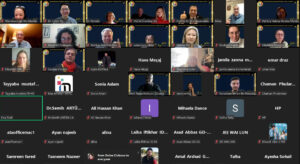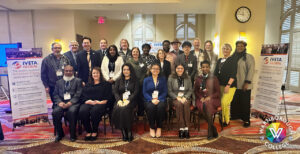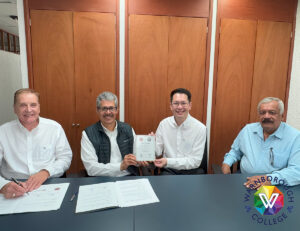Published in conjunction with European Vocational Skills Week 2020.

Gouhar Pirzada
(M.Phil. Scholar, University of Management & Technology UMT Pakistan)
Since 2000, the European Union (EU) has become the most competitive and dynamic knowledge-based economy in the world. Member states committed themselves to increase European cooperation in vocational education and training (VET) through the Copenhagen process by aligning with the knowledge-based economy goal. The Copenhagen process is an integrated part of the Lisbon strategy in which VET must be developed to play its active and key role in furthering lifelong learning policies and supplying the highly skilled workforce necessary to make Europe one of the most competitive and dynamic knowledge-based economies and societies in the world. However, VET has a key role to play in alleviating potential negative effects that demographic change can have on EU economies and societies.
The objective of making vocational education and training (VET) globally competitive and attractive by the European Union has put vocational education in the spotlight (Misra, 2011). Vocational education is often overshadowed by their counterparts in general education as societies give more importance to academic education. This is embodied in the fact that many international studies do not make particular reference to the peculiar problems in vocational education (Grollmann 2008). Developing countries across the globe are in a need to develop 21st century skills that are a significant part of the advanced development of the VET sector in Europe that would ultimately help the developing nations in their economic growth.
In the context of developing countries like Pakistan, it is important to design policies and standards according to global requirements. In a country with 2.9 million children out of school and doing hard labor jobs to meet their financial needs, with an unemployment rate of 5.9%, literacy rate of 58%, employers’ dissatisfaction rate with fresh graduates of 78%, Technical Education and Vocational Training (TVET) could make a significant contribution to improving the current situation. Training for specific skills development plays a vital role in not only individual and organizational development but also for the country’s economic growth and human resource development particularly from overseas remittances (Mustafa, Abbas et al. 2005). The inclusion of technology, communication, collaborations, critical thinking, and creativity will encourage the growth of the TVET sector in the county.
Vocational education and training are also important for skilled labor productivity and mobility that assist in balancing labor markets in the market (Mustafa, Abbas et al. 2005). Whereas, the success of any educational initiative is highly dependent on the training providers who carry it out in classroom situations. In this background, it is important to train assessors and develop their competencies according to the 4Cs of 21st century skills. These include Critical thinking, Communication, Collaboration, and Creativity.
Critical Thinking: Critical thinking in the 21st century is defined as the ability to solve problems, design projects, and make effective decisions through different tools and resources. It addresses the challenge of designing educational experiences that highlight real-world problems that would have no clear answers. This skill requires students to collect, process, integrate, rationalize and then critically analyze large information for making effective decisions. The process of critical thinking could support digital tools and resources particularly for creating relevant learning experiences that assist students to discover, design and use new knowledge. The world and the developed nations are currently moving towards higher-order thinking skills: the ability to think logically, and to solve ill-defined problems. However, the acquisition of this skill will enable students to analyze information critically, formulate creative solutions, and then taking action.
Communication: In the context of 21st century, communication not only includes the ability to write or speak but it also includes listening skills. Mostly, the international framework also includes digital literacy in the concept of communication (e.g., the British Columbia Ministry of Education’s Cross-Curricular Competencies). New advanced technology and digital tools represent a new era of interaction in which the ability to communicate successfully is important for success in the 21st century. Effective communication requires productive interaction between the assessors and the learners that could be done easily through social media. The inclusion of the English language as a necessary source in the curriculum and medium of instruction for the TVET system in Pakistan is an essential part of the current development strategy in developing nations.
Collaboration: Other than critical thinking and communication, one more important skill that is a need in the context of 21st century is of communication. It requires working in teams, learning from others, and then contributing to their work, and demonstrating empathy to the work with diverse groups. Collaboration also requires developing collective knowledge and then constructing useful insights from the experiences of both parties. New skills and knowledge could be developed through digital collaborations and then to contribute to the collective knowledge base. Knowledge from the collaboration could be achieved from a shared physical space or through working remotely. Leadership Skills & Team Management could also be developed from collaboration. The collaborations could be done among international and national bodies, public and private sector organizations, VET practitioners and much more. Synergistic collaboration with local & regional industry promises to establish the basis for an effective demand-driven VET.
Creativity and Innovation: Many studies have given significant importance to creativity and innovation. This skill will help to compete in business and to generate economic growth. Innovation is often defined as “something that is unique and new from the usual routine”. Additionally, creativity is described as “the pursuit of new ideas, concepts, or products that are a need of the world”. The problem-solving attitude is developed among the students by acquiring the 21st century skill of creativity and innovation. This skill also includes the concepts of economic and social entrepreneurship and leadership for action. The current VET sector of developing nations is currently at a comparatively average stage that could be developed by introducing creativity and innovation.
The success of the VET sector of any country depends on the skills and competencies of the assessors and on the delivery methods they adopt to convey those skills and strategies. The research in the VET sector of the developing nations will help to provide in-depth knowledge of the existing practices across the globe. Moreover, there is a need to highlight the existing gaps in the institutes that will eventually help to achieve global standards. In the EU, the assessors are trained enough to deliver 21st century skills with particular attention to the 4Cs mentioned above. The delivery mechanism and adoption of skillful approaches encourage the VET sector there to set standards for others. Therefore, continuous improvement is necessary to build the TVET sector according to global requirements, and in this way, developing counties would also be able to play a key role to improve the VET sector across the globe.
In a developing country like Pakistan, there is a need to introduce reforms on a national level to improve the current structure, teaching mechanisms, curriculum of the study, and methods of delivery in the technical educational centers running across the country. The acquisition and then implementation of the 4Cs skills of 21st century discussed above is the key reason for the success of VET sector in Europe. The reasons for success of a developed VET system in the west must be adopted in the east that will help them to mitigate their problems and build effective TVET systems. This transition of acquiring 21st century TVET skills could act as one key lesson that could be learnt from VET systems and practices from Europe.
References
- Perreault, W. D., & McCarthy, E. J. (1990). Basic marketing: a managerial approach. Irwin.
- Mustafa, U., Abbas, K., Saeed, A., & Anwar, T. (2005). Enhancing Vocational Training for Economic Growth in Pakistan [with Comments]. The Pakistan Development Review, 567-584.
- Grollmann, P. (2008). The quality of vocational teachers: Teacher education, institutional roles and professional reality. European Educational Research Journal, 7(4), 535-547.
- Grollmann, P., Spottl, G., & Young, M. (2008). Towards a European qualifications framework: some cautionary observations. Journal of European Industrial Training.
- Ansari, B., & Wu, X. (2013). Development of Pakistan’s technical and vocational education and training (TVET): An analysis of skilling Pakistan reforms. Journal of Technical Education and Training, 5(2).
- Gordon, J. (2015). Glimpsing the Future in the Past: VET in Europe. European journal of education, 50(4), 440-460.
- United Nations Educational, Scientific and Cultural Organization (UNESCO). (2016). Strategy for technical and vocational education and training (TVET)(2016-2021).
- Misra, P. (2011). VET teachers in Europe: policies, practices and challenges. Journal Of Vocational Education & Training, 63(1), 27-45. doi: 10.1080/13636820.2011.552732




